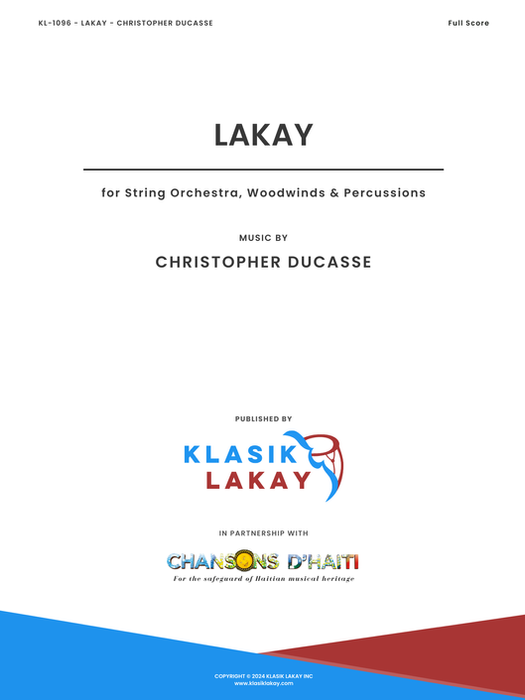
Koze Dantan (String-Perc)
Composer/Arranger
music by Christopher Ducasse
Instrumentation
for String Orchestra and Percussions
Violin I - Violin II - Viola - Cello - Bass
Conga
Duration
4:40 minutes
Koze Dantan (String-Perc)
$40.00
SKU:
Policy
Instrumental works include 1 Full Conductor Score and Parts (8/8/5/5/5 for strings, and 1 per any other instruments).
It is a breach of copyright law to make more copies than the amount purchased. Please order the number of copies needed for every member of the ensemble, including the conductor and the accompanist.
Sold by
Klasik Lakay
Digital (PDF)
Preview Score
Featured Video
Description
"Koze Dantan," which is a Haitian Title that means "Old Time Stories," is a reminiscence of some habits in Haiti where in the old days, families would hang out at night, and the older would tell stories to the young. Those stories would vary from horror to war, love, and funny stories; in summary, it was stories about how their time differed from what we were living in, which was a way to keep the memories from the past alive, and also for us the next generation to learn from the more experiences and move towards a better future.
This composition is based on a Haitian Rhythm called "Yanvalou." Yanvalou is a Rhythm and Dance of Haiti named after its associated movements. Yanvalou is one of the most important rhythms in Haitian folklore; it is sometimes linked to "Knowledge," "Patience," "Strength," and "Healing." Usually played on Three different congas named "Manman (mother)," "Segon (second)," and "Kata," the latter being always played with sticks on the body of a conga, or one Conga playing a combination or summary of all those three instruments. The beat of the rhythm of Yanvalou is a combination of
Triple-Duple time (1-2-3 |1 2) in this composition, with three eighth-notes forming the triple and two dotted eighth-notes (or eighth-notes Duplet) for the duple.
Description
"Koze Dantan," which is a Haitian Title that means "Old Time Stories," is a reminiscence of some habits in Haiti where in the old days, families would hang out at night, and the older would tell stories to the young. Those stories would vary from horror to war, love, and funny stories; in summary, it was stories about how their time differed from what we were living in, which was a way to keep the memories from the past alive, and also for us the next generation to learn from the more experiences and move towards a better future.
This composition is based on a Haitian Rhythm called "Yanvalou." Yanvalou is a Rhythm and Dance of Haiti named after its associated movements. Yanvalou is one of the most important rhythms in Haitian folklore; it is sometimes linked to "Knowledge," "Patience," "Strength," and "Healing." Usually played on Three different congas named "Manman (mother)," "Segon (second)," and "Kata," the latter being always played with sticks on the body of a conga, or one Conga playing a combination or summary of all those three instruments. The beat of the rhythm of Yanvalou is a combination of
Triple-Duple time (1-2-3 |1 2) in this composition, with three eighth-notes forming the triple and two dotted eighth-notes (or eighth-notes Duplet) for the duple.
























